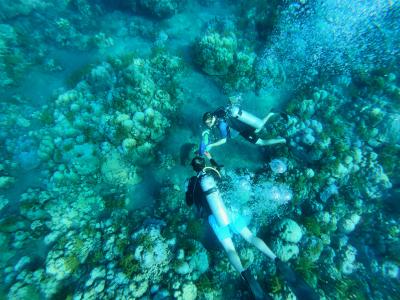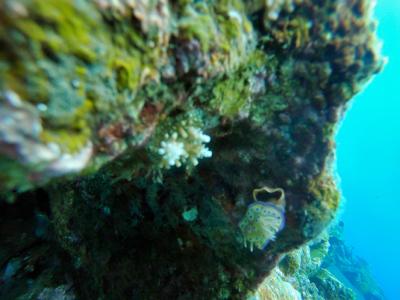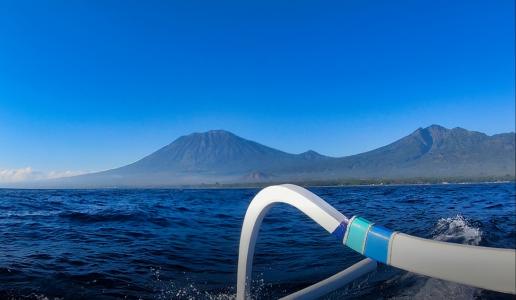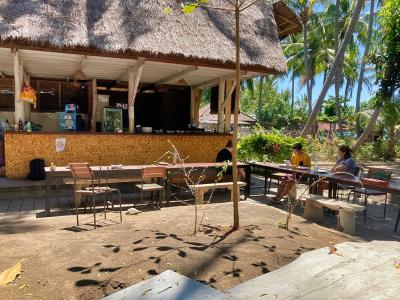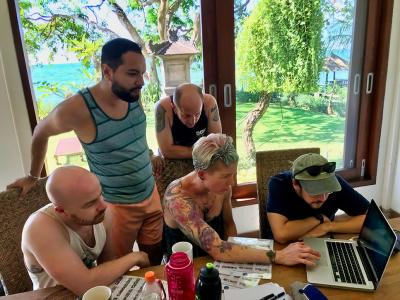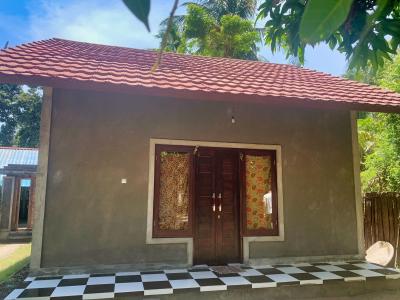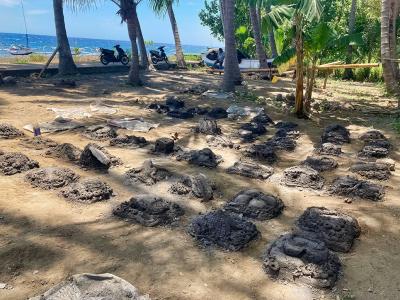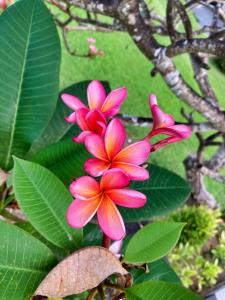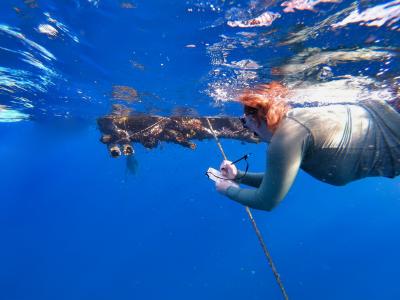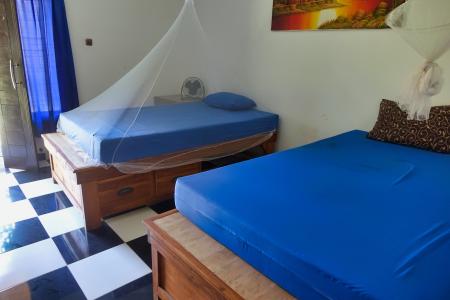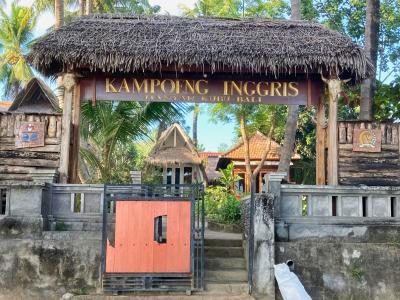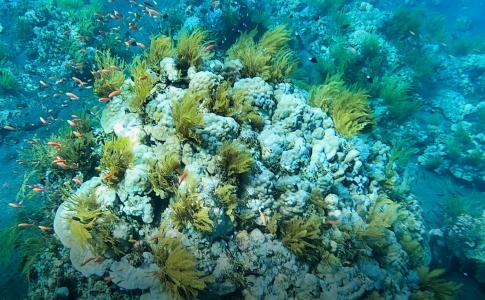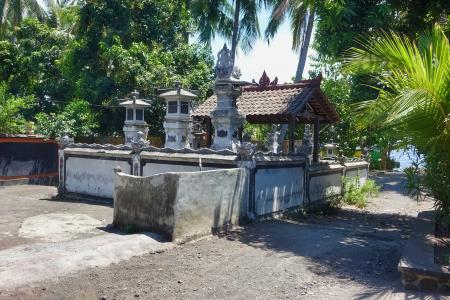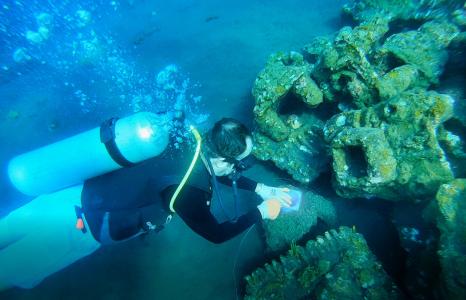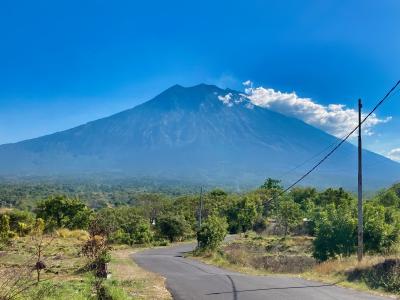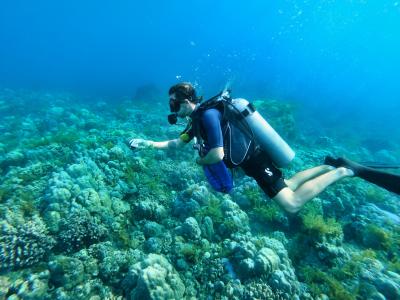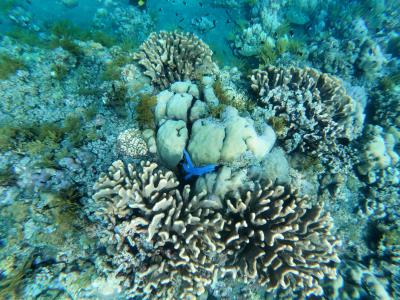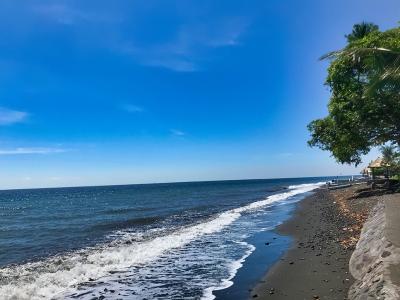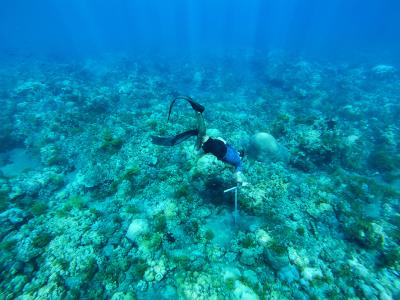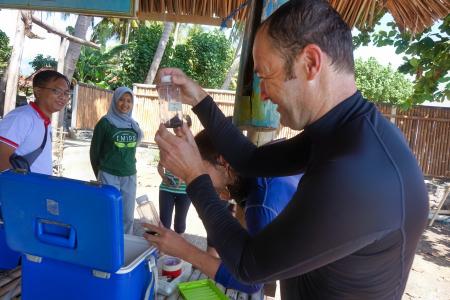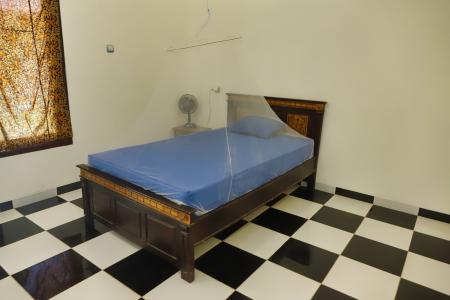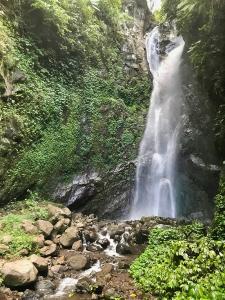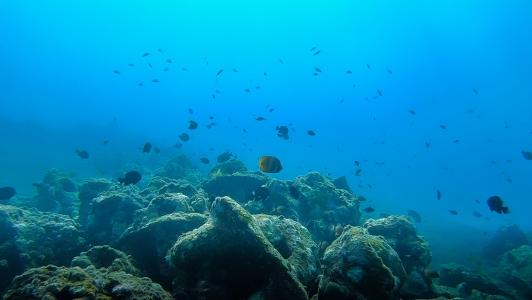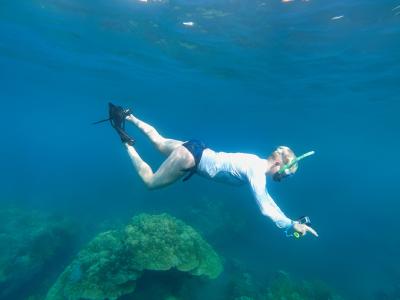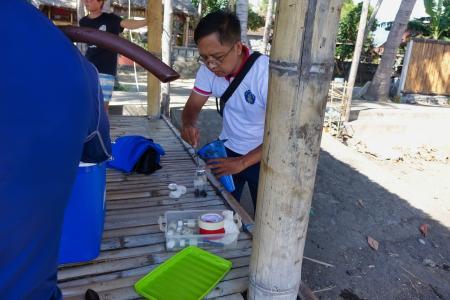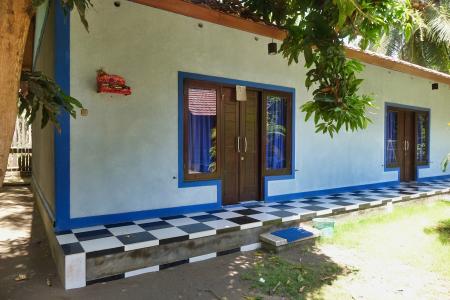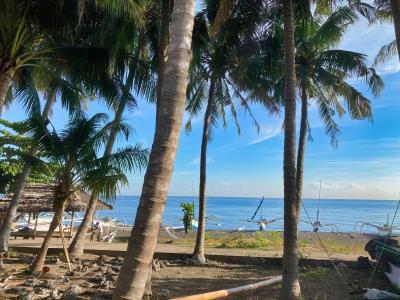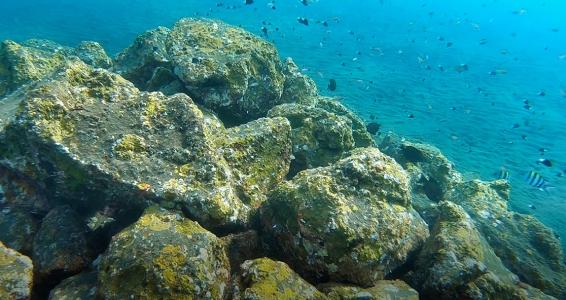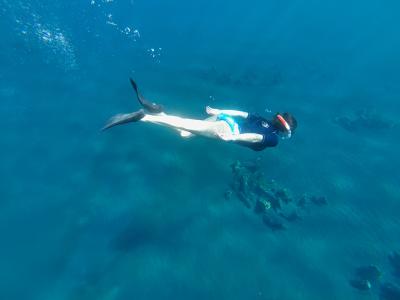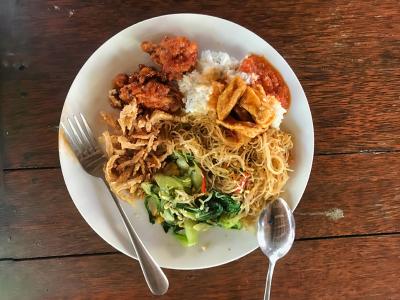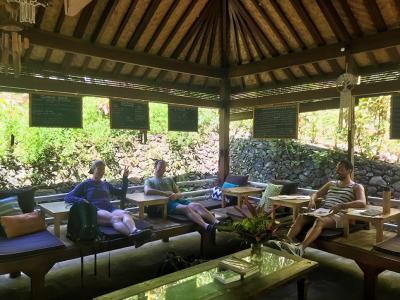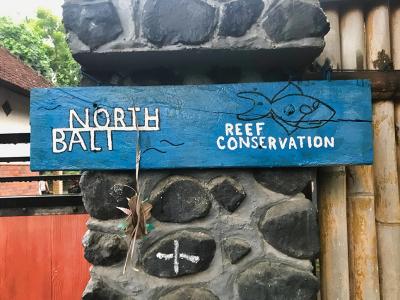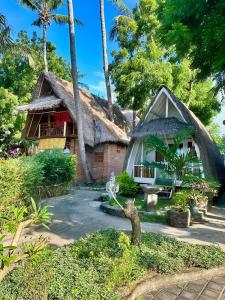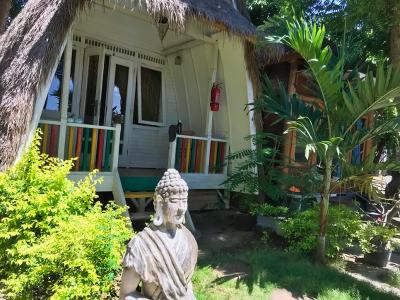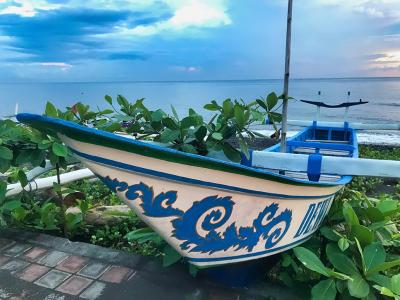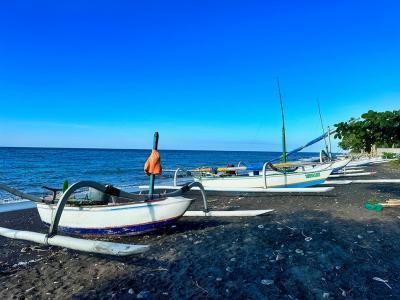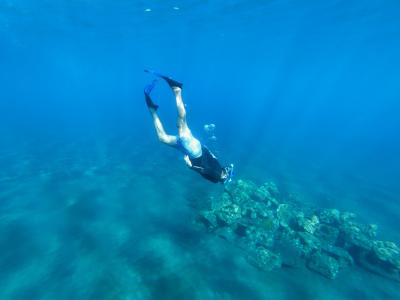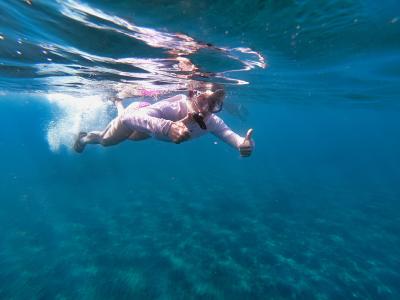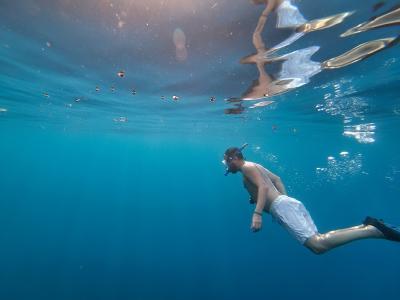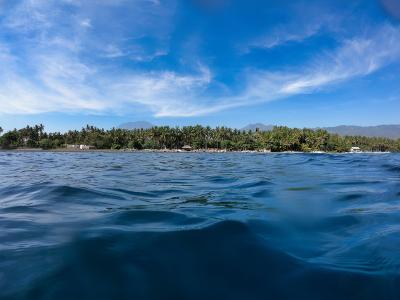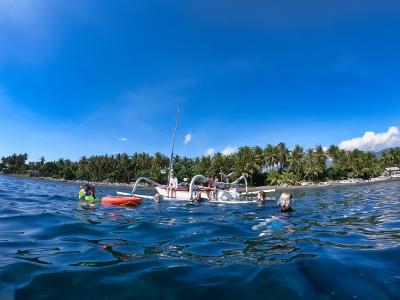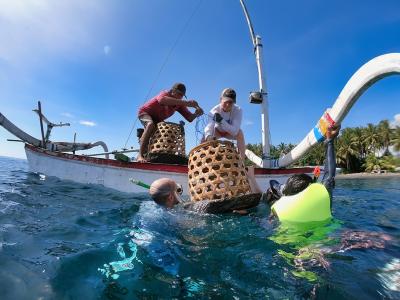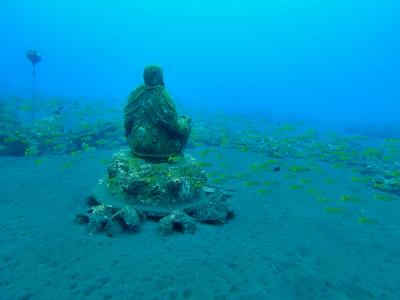Please read the following information carefully before leaving for your expedition.
Restoring Coral Reefs in Bali
Expedition Briefing
Quick Navigation: COVID-19 Safety | The Research | Research Aims | How You Will Help | Life in the Field | Accommodations and Food | Project Conditions | Essential Eligibility Requirements | Health and Safety | Project Risks and Precautions | Travel Planning | Additional Resources
Click on the images to view full size!
COVID-19 SAFETY
You are strongly encouraged to test for COVID-19 before traveling to your expedition, particularly if you are experiencing symptoms. Do not travel if you have tested positive, and call Earthwatch right away for the next steps. Please see earthwatch.org/covid-19 for more information.
The Research
The small village of Kubu in northern Bali is home to a large community of fishermen who rely on healthy coral reefs to serve as a habitat for fish species. Previously, these reefs were exploited due to unsustainable fishing practices that degraded the coral and decreased the number of fish. Today, the reefs are part of a locally established Marine Protected Area (MPA) that helps to safeguard them by preventing fishing and other human activities. These protections have enabled the coral communities to recover, and the spillover of fish wandering outside the MPA supports the local fishers. The fishers and the community now recognize the importance of the protected area to ensure fish populations stay healthy and have been following the no-take rules of the MPA. However, the reefs face other pressing threats. The 2022 IPCC report states warmer and more acidic waters will devastate coral reefs worldwide. Coral reefs are essential not only because of their ability to maintain the biodiversity of the world’s oceans but also because of their beneficial role for humans. Reefs provide local communities with food, storm protection, and revenue through tourism. While artificial reefs won’t completely replace the benefits of natural reefs, implementing them in strategic locations could enhance food security and prevent marine ecosystems from collapsing as climate change degrades existing natural reefs.
The nonprofit North Bali Reef Conservation (NBRC) has implemented approximately 13,000 artificial reef units in the waters off the shore of Kubu since 2016. These reefs are made from a mixture of cement, calcium carbonate, and sand and are made to mimic the habitat provided by natural reefs. On this project, you’ll investigate the extent to which artificial reefs can mimic the natural communities, ecosystem services, and socio-economic benefits of coral reefs. You’ll snorkel or scuba dive* over both artificial reefs and natural reef communities to conduct coral surveys, camera work, and fish community surveys to assess the communities’ biodiversity, identify predatory fish, calculate the biomass of grazers, and sample nutrient levels.
Coral reefs are very sensitive to environmental threats facing the world’s oceans— from climate change to overfishing to habitat destruction. This project will help answer critical questions about how artificial reef structures can help combat ecological and economic losses, including food instability, as natural reefs deteriorate.
*Note: Certification is required for participation on scuba teams. See the Essential Eligibility Requirements in this document for detailed requirements.
Research Aims
The main goals of this project are to:
- Assess the development of ecological communities on artificial reefs and monitor the time until these communities become stable;
- Compare stable, established communities on artificial reefs to nearby natural reefs and determine the connectivity of the artificial reefs to other ecosystems;
- Compare the levels of organic carbon in sediment and assess the cycling of carbon through the community;
- Estimate the abundance of functional groups on artificial reefs and assess the short and long-term roles of predators on overall abundance to determine if predators can affect the carbon budget of ecological communities.
How You Will Help
As an Earthwatch volunteer, you will spend much of your time snorkeling or diving over coral reefs to assist in three main types of fieldwork: snorkel/dive surveys, video deployment, and data analysis.
Snorkel and Dive Surveys
You’ll snorkel (or scuba dive) over both artificial and natural reefs to record the coral, sponges, gastropods, and fish in quadrats on the reefs. You’ll record these data either on underwater slates or by taking photographs. These surveys will help monitor how quickly communities are established on newly introduced artificial reefs and compare communities on established artificial and natural reefs. You may also collect water and sediment samples at different points along the reef structures to help assess the available nutrients within the different communities.
Video Deployment
You’ll help deploy underwater cameras, known as remote underwater video (RUV), to monitor mobile marine animal communities. The RUV cameras will be placed near natural and artificial reef units. After 30 minutes, the cameras will be retrieved. The videos will be analyzed to determine the number of species and individuals recorded. This will help researchers to compare the biodiversity and community structure of natural and artificial reefs.
Data Analysis
After careful training, you’ll analyze the images and videos taken along the reefs and identify the species present. You may also be involved in helping analyze microbial samples using on-site microscopes and process water and sediment samples, which will be sent for analysis at a local lab.
Life in the Field
You will spend portions of the first two days becoming familiar with core fieldwork and analysis techniques, including photoquadrat sampling and using and analyzing remote underwater videos (RUVs) to assess mobile reef communities. Other educational opportunities will be offered throughout the expedition, covering topics such as climate change and its impact on coral reefs, methods to restore coral reefs, ecosystem services associated with coral reefs, coastal management, and basic reef species identification. On some teams, there may also be opportunities to visit local university laboratories to see how some collected samples are analyzed.
While Earthwatch participants are the sole supporters of scientific data collection, NBRC hosts several volunteer groups that will likely overlap with Earthwatch groups, including those assisting with constructing and deploying artificial reefs or teaching English at the onsite school.
DAILY ACTIVITIES
Weather and research needs can lead to changes in the daily schedule. We appreciate your cooperation and understanding.
ITINERARY
FOR ONE-WEEK TEAMS:
Day 1: Arrival
- Rendezvous at Ngurah Rai International Airport, Denpasar
- Travel to Tianyar, North-East Bali, and settle into the accommodations
- Project introduction and safety overview
- Team dinner
Day 2: Orientation & Training
- Orientation to research objectives, including a first-hand look at the reefs
- Training in field research tasks & identification of reef species
- Afternoon fieldwork
Days 3–6: Data Collection
- Fieldwork training (if new techniques)
- Morning & afternoon fieldwork sessions, which may include:
- Snorkel OR dive surveys (team dependent) on natural and artificial reefs
- Deployment of remote underwater video (RUV) cameras
- Conducting biomass surveys at offshore fish aggregation devices (FADs)
- Collection of sediment & water samples (SCUBA teams only)
- Video analysis & sample processing
- Down-time or evening research lecture
*Note: Teams may participate in a group recreational outing on one afternoon. Possible activities include visiting a local research institute, waterfall, or temple.
Day 7: Departure
- Depart Tianyar for the airport
FOR TWO-WEEK TEAMS:
Day 1: Arrival
- Rendezvous at Ngurah Rai International Airport, Denpasar
- Travel to Tianyar, North-East Bali, and settle into the accommodations
- Project introduction and safety overview
- Team dinner
Day 2: Orientation & Training
- Orientation to research objectives, including a first-hand look at the reefs
- Training in field research tasks & identification of reef species
- Afternoon fieldwork
Days 3–13*: Data Collection
- Fieldwork training (if new techniques)
- Morning & afternoon fieldwork sessions, which may include:
- Snorkel OR dive surveys (team dependent) on natural and artificial reefs
- Deployment of remote underwater video (RUV) cameras
- Conducting biomass surveys at offshore fish aggregation devices (FADs)
- Collection of sediment & water samples (SCUBA teams only)
- Video analysis & sample processing
- Down-time or evening research lecture
*Note: Two-week teams will have a recreational day mid-way through the team. The group will participate jointly in one of several potential activities, which may include a visit to a local research institute, waterfall, or temple.
Diving will not be permitted on the recreational day such that the team can observe a mandatory 24-hour de-gas period between consecutive dive days. Team activities will be planned so that participants can observe a 24-hour de-gas period before boarding onward flights.
Day 14: Departure
- Depart Tianyar for the airport
Money Matters
LOCAL CURRENCY: Indonesian Rupiah (IDR)
PERSONAL FUNDS: You may wish to convert the equivalent of 100 - 200 USD to cover any taxis between the airport and your hotel before the team begins and/or any snacks and drinks you may wish to purchase at the local shop or during the recreational day excursion. Foreign exchange and ATM services are provided at the airport in Denpasar. Visa and Mastercard are commonly accepted in Bali but not in rural areas where most of the project is conducted.
Accommodations and Food
* Please note that not every expedition has couples’ or singles' accommodations available. Please call or email Earthwatch to check availability before reserving your space(s) on the team.
SLEEPING
The team will stay at the volunteer accommodation in Tianyar, which is owned by the non-governmental organization North Bali Reef Conservation. Volunteers will stay in dormitory-style rooms, each with a shared en suite toilet and shower. The accommodation is just a short walk from the beach. Your accommodation is a clean and friendly environment you can call home during your time on site.
Here is what you can expect:
- Shared dorm room with 2–4 other same-gender volunteers
- Shared western-style bathroom with toilet & shower
- Table fans
- Bed sheets provided (changed weekly)
- Free onsite Wi-Fi access
- 24-hour security
- Laundry service (extra volunteer cost)
* Earthwatch will respectfully and without judgment honor each person’s assertion of gender identity. For both teen and adult teams, where logistics dictate single-sex accommodations or other facilities, participant placements will be made in accordance with the gender identity the participant specified on their Earthwatch Participant form and/or preferences indicated in discussions with Earthwatch.
BATHROOMS
Bathroom facilities include flush toilets and cold-water showers (hot water is unavailable). Toiletries are not provided but can be purchased at nearby shops.
ELECTRICITY
There is regular 24-hour electricity at the accommodations, and you will have access to outlets to charge cameras, cell phones, and other personal electronic devices. Indonesia uses the 2-pin socket (standard European plug); you should bring an adapter.
PERSONAL COMMUNICATIONS
Wi-Fi is available during downtime on personal electronic devices, though connectivity can sometimes be unreliable, given the site's remoteness. Cell phone reception in the area is generally good, and local SIM cards may be purchased at the airport at a low cost on arrival if desired.
Please note: Personal communication with outsiders is not always possible during an expedition. Earthwatch encourages volunteers to minimize outgoing calls and immerse themselves in the experience; likewise, family and friends should restrict calls to urgent messages only.
DISTANCE TO FIELD SITE
The accommodations are a three-hour drive from the airport, and volunteer pick-up/drop-off is provided using 7-seater cars or minibuses. The accommodations are only a short walk from the research site and shops selling daily supplies. A vehicle and driver are always available onsite in case of emergencies.
Some research trips may involve short boat rides (less than 15 minutes). The boats used are small traditional Indonesian fishing boats with outriggers. Generally, sea conditions are calm at the research site. If you are known to get motion sickness, we recommend bringing medicine as advised by your local medical professional. If you are on a diving expedition, you should check with a medical professional to see if any motion sickness tablets are compatible with diving.
FOOD AND WATER
A dedicated team of local chefs will prepare breakfast, lunch, and dinner for volunteers. Meals will be eaten communally at the accommodations and include local Indonesian and international cuisine. The communal eating space is outdoors (covered by thatched huts) and hosts Earthwatch volunteers and other volunteer groups at NBRC. Hot water is unavailable from the kitchen tap, but boiled water is provided for hot beverages.
The following are examples of foods you may find in the field. Variety depends on availability. We appreciate your flexibility.
TYPICAL MEALS
- Breakfast: Pancakes, toast, french toast, egg selection, fresh fruit, fried banana, coffee & tea
- Lunch and dinner: Fried rice, fried noodles, pasta, redang (Indonesian slow-cooked meat dish that can be made vegetarian), gado-gado (salad with peanut sauce), soto (broth-based meat & vegetable soup), fried chicken, satay, noodle soups, potato wedges/ French fries, vegetable fritters, western style salad. Note: Red meat is not commonly on the menu.
- Beverages: Clean drinking water, coffee, and tea are available on-site for free. A nearby canteen sells other drinks and local snacks.
SPECIAL DIETARY REQUIREMENTS
Please alert Earthwatch to any special dietary requirements (e.g., diabetes, lactose intolerance, nut, other food allergies, vegetarian or vegan diets) as soon as possible and note them in the space on your participant forms.
This project can cater to various diets, including vegetarian, vegan, lactose-free, gluten-free, and Kosher. Soy and/or peanut allergies are difficult to accommodate. Peanuts, peanut oil, and soy are common in Indonesian cuisine; thus, it is impossible to guarantee peanut and/or soy-free food.
Project Conditions
GENERAL CONDITIONS
Please visit wunderground.com and search your project location for weather and region-specific information.
Essential Eligibility Requirements
Volunteers must be at least 18 years of age and should not have a phobia of water or marine life. All participants must be able to:
- Comfortably swim 800m in calm, open water
- Dive/swim/snorkel two times a day for ~1–2 hours in areas where it is not possible to stand on the bottom
- Duck-dive to a depth of 4m for a maximum of 10–15 seconds (This is especially important for taking close-up photoquadrat samples of the benthic substrate)
- Utilize all equipment recommended or required by industry standards, including masks, fins, and snorkel.
- Maintain a seated, cross-legged, and upright position within a narrow-outrigger boat during transit, which can sometimes be bumpy. Although boat trips usually last less than 15 minutes, this can be uncomfortable for individuals with back and joint problems.
- Comfortable riding in a boat seated at the level of the deck without exterior supports.
- Comfortable entering and exiting the boat from land and water, which includes stepping up onto the boat platform 1m off the ground and climbing up and down a ladder to enter and exit the water.
- Walk short distances in sand or uphill with a light pack
- Stoop, bend, or kneel multiple times during the day
- Spend long hours in the field in hot and sunny conditions
- Tolerate insect bites (mosquitos, no-see-ums, and coconut bugs) and tropical wildlife (including lizards, bats, and insects), and comfortable around free-ranging outdoor dogs (these are abundant around the research accommodations)
- Follow verbal and/or visual instructions independently or with the assistance of a companion.
- Take an active role in your safety by recognizing and avoiding hazards if and when they arise (including, but not limited to, those described in Earthwatch materials and safety briefings). Always comply with project staff instructions and recommended safety measures.
- Effectively communicate to the staff if you are experiencing distress or need assistance.
- Get along with a variety of people from different backgrounds and ages, often in close proximity, for the duration of your team.
- Be comfortable surrounded by a language and/or culture different from yours.
Additional Requirements for SCUBA Teams:
To participate as a scuba diver on this project, you must meet the below additional requirements:
- Hold at least a PADI Advanced Open Water certification (or equivalent qualification from a recognized certification program) and supply a copy of such certification to Earthwatch
- Must have completed at least one dive within the 12 months before participation or complete a refresher course at your own expense before participating in dive activities
- Submit a signed Earthwatch Diver Medical Form before participation (this is in addition to the Earthwatch Participant Form)
- Provide proof of dive insurance (through DAN or equivalent)
- Comfortable diving for an hour at depths up to 18m (excellent buoyancy control is required), & able to monitor own dive data using a dive computer
- Lift 35 lbs. of equipment (for example, research equipment and/or dive gear) and carry it 200m to the shore entry point
- Possess sufficient strength and balance to enter the water in full gear from a beach that is rocky and steeply graded
Health and Safety
EMERGENCIES IN THE FIELD
Field staff are equipped with mobile phones to communicate to and from the field. A vehicle and driver are always accessible in case of an emergency.
Earthwatch has a 24-hour, 7-day-a-week emergency hotline number. Someone is always on call to respond to messages that come into our live answering service.
IMMUNIZATIONS & TRAVEL VACCINATIONS
Please be sure your routine immunizations are up to date (for example, diphtheria, pertussis, tetanus, polio, measles, mumps, rubella, and varicella) and that you have the appropriate vaccinations for your travel destination. Medical decisions are the responsibility of each volunteer and their doctor. Visit the Center for Disease Control and Prevention or the World Health Organization for guidance on immunizations.
If traveling from countries or regions where yellow fever is endemic, you must have a certificate of vaccination.
Rabies is present in Bali and can be transmitted by bats, free-ranging dogs, and other mammals. Free-ranging dogs are present at the project site and are prevalent in Bali. Pre-exposure vaccination does not eliminate the need for post-exposure medical attention and treatment. Still, it does provide additional protection against the disease in the event of a delay in treatment. The nearest medical facility providing post-exposure treatment for rabies may take two hours or more to reach from the project site, and the availability of vaccines can vary.
Staying up to date with your COVID-19 vaccinations, including receiving booster doses as applicable, is strongly encouraged.
Project Risks and Precautions
TRANSPORTATION
Participants will be driven in a car from the rendezvous to the field site and sometimes to other activities. There is a risk of road traffic accidents. Only vehicles with seat belts will be used, and vehicles will only be driven by staff with an international or Indonesian license and approved by the PI. Drivers will practice safe driving practices, including limiting speeds to 40 mph on narrow mountain roads, cautious passing, and safe following distance. Those who experience motion sickness may consider bringing personal medications. Participants will not drive under any circumstance. A cell phone and first aid kit will always be carried in vehicles. There will be no driving at night except in the case of an emergency. Participants will not drive or ride on motorbikes.
Small local fishing boats may be used for research activities. There is a risk of a boating accident and injury or drowning from falling overboard. Boats will be operated only by people approved by the PIs. Participants are required to wear personal floatation devices while aboard the boats. Boats will be equipped with appropriate safety equipment, including a throw ring, spare mobile phone, first aid kit, emergency contact list, and life jackets for each person. Staff will brief participants on boating risks and precautions onsite, including proper protocols for entering and exiting the boat and donning any necessary dive/snorkel gear. Participants are advised to avoid dangling their arms and legs over the boat's edge, to hold onto the boat's sides with both hands while in transit, and to take caution in the water when passing underneath the boat's outriggers to avoid head and other injuries. In the event of bad weather, the use of boats will be prohibited.
FIRE
Due to the climate and weather, there is a fire risk in the accommodations. All rooms are fitted with smoke alarms and fire extinguishers. A fire blanket is available in the kitchen. Participants are briefed on the procedure if there is a fire. Participants' electrical equipment must be compatible with the electrical system (voltage/outlets abroad may differ).
ANAPHYLACTIC SHOCK/ALLERGIES
There is a risk of adverse allergic reactions while on the expedition, including from food, insects, or environmental allergens. Participants with known allergies must bring appropriate medications (at least two Epi-pens, antihistamines, etc.) in case of an allergic reaction. Participants who utilize Epi-pens must notify staff of their locations while fielding. Field staff will be briefed on dietary requirements through participant forms.
SNORKELING/SWIMMING
Snorkeling is a physically demanding activity with inherent risks. Safety procedures are established to minimize the risk associated with snorkeling and outlined during the safety briefing before commencing the research activities. Duck dives will be limited to depths of 4m. Snorkelers must be able to use the appropriate technique to equalize as they duck-dive to avoid eardrum injuries and demonstrate the proper use of snorkeling equipment (including how to clear masks and snorkel, appropriate techniques for fin use and tips for safe breath holding). Before beginning fieldwork, participants’ abilities and stamina will be assessed in a shallow water environment. Personal flotation devices will be provided as needed, and PI or support staff will be in the water during all research activities. Swimming/snorkeling is only done in calm seas and with a buddy. Participants may do recreational swims, but they must swim with a buddy and inform a staff member of their route and expected return time. Participants must always remain within 5m of their snorkel buddy.
DIVING
Scuba diving is a physically demanding activity with inherent risks. Safety procedures are established to minimize the risk associated with diving and should be followed closely. As with all diving activities, there is a risk of decompression illness (DCI). It can take up to 5 hours to arrange transport to the nearest hyperbaric chamber, details of which are provided in the Emergency Response Plan. Only participants in good health and with appropriate insurance, experience, and certifications can participate on Earthwatch dive projects. A divemaster supervisor is always present with divers, and project staff are first aid qualified. Participants are guided down and up slowly to prevent descending and ascending too quickly. A diver response plan is in place, and participants are advised on the protocol for a lost buddy. For activities split across more than one habitat type, a staff member trained in rescue diving will be at the surface to receive divers in distress. Oxygen is kept on the boat, and diver-down flags are employed for snorkeling and diving. Dives will not exceed a depth of 18m and will have a maximum time of one hour.
WATER ORGANISMS
Fire coral is present at the research sites and can cause a red, swollen, and potentially painful rash. During the initial safety briefing, participants will be trained about the appearance of fire coral and the impact of touching stinging organisms. Volunteers will be shown fire coral in the water when it is present. Protective gear, including a long-sleeved rash vest/legging or a wetsuit, is advised when working near fire coral, and gloves will be worn when installing sediment traps on the benthic substrate. Participants should indicate if they have an anaphylactic reaction to insect stings and consult with their physician before participating to determine if a similar response might occur because of being stung by jellyfish or other marine organisms (small cnidarians can also be present in the water column and cause discomfort). There may also be venomous fish in the water, including stonefish, which cause extreme pain, headaches, and breathing difficulties if touched. Participants will be shown stonefish if present, and all staff are briefed on steps to treat envenomation.
SHARKS AND OTHER LARGE FISH
Shark and other large fish attacks are extremely rare but possible. Volunteers are to exit the water calmly if an animal acts aggressively.
HEAT
High temperatures and long days in the sun can cause sun exposure, dehydration, and sunburn. Participants should wear breathable clothes that cover their skin, reapply sunscreen throughout the day, and consistently drink water. Participants must communicate with field staff if they are not feeling well due to the sun and temperature.
HIKING
Falling, getting cuts, or twisting an ankle are potential risks while hiking. Although not a required part of the expedition, hiking may be offered during recreational time. Participants should wear proper footwear, have good endurance, and, at times, have protective clothing in the thick bush to avoid cuts and scrapes. Participants must inform research center staff of the route and expected return time.
REMOTENESS/DISTANCE FROM MEDICAL CARE
The nearest rural medical clinic is about a 10-minute drive from the project accommodations. However, it can take two hours or more to reach the nearest hospital and five or more hours to arrange transport to top-tier private hospitals in Denpasar—including the closest facility with a hyperbaric chamber. Local emergency services, such as police and fire services, can be unreliable. If you have a chronic condition that could require immediate medical care (e.g., heart conditions, kidney problems, severe asthma, etc.), or if you are pregnant, please discuss your participation on this expedition with your physician.
ANIMALS & PLANTS
Mosquitos, no-see-ums, and coconut (blister) bugs are present and bite. Mosquitos in Bali can carry various diseases, including Japanese encephalitis, malaria, Zika, dengue fever, and chikungunya. Participants who are especially sensitive to insect bites should not attend this project. Participants should bring insect repellent and wear long-sleeve shirts and long pants during the evening hours. Participants are advised to keep doors and windows closed during the early morning and evening hours.
Domestic animals, including semi-stray dogs, are present in the camp. Participants should not approach or touch domestic animals, including dogs, cats, chickens, ducks, or any pet in the camp or town.
There is also the potential risk of coconuts falling from the trees. Trees are regularly maintained, but participants should not stand under coconut trees whenever possible.
CULTURE
In entering a new community with a different culture than your own, there is a risk of offending the local culture and beliefs. Participants should learn about the local culture ahead of time and will be advised on behaviors that may offend local people. Participants should cover their shoulders and knees when visiting local public areas, including the beach, temples, and shops. Beach wear should be modest.
ENVIRONMENTAL HAZARDS
The monsoon season runs from November to March, and Earthwatch expeditions will not be scheduled during this time. Seismic activity, including earthquakes and tsunamis, is a concern throughout Indonesia. Bali also has active volcanoes, including Mount Agung, which is visible from the project site. Field staff will monitor local media and be vigilant for alerts of natural hazards. Participants are advised to monitor local media when traveling to stay informed of any alerts and to avoid dangerous areas.
CRIME
Petty and opportunistic crime is a risk in Indonesian urban centers, including the tourist centers of Bali. Participants are advised to keep valuables hidden and to avoid excessive drunkenness, illegal drug use, and overtly suggestive behavior. They should also use reputable transport services while traveling in Bali and avoid using unmarked or freelance taxis. The dorms at NBRC are equipped with locking doors.
DISEASE
Diseases present in Indonesia include Japanese encephalitis, malaria, Zika, dengue fever, chikungunya, leptospirosis, schistosomiasis, rabies, measles, hepatitis, typhoid, cholera, tuberculosis, avian/bird flu, and hantavirus. Travelers’ diarrhea is common in visitors to Bali. Participants should speak with their medical care provider or a travel health provider, take appropriate precautions, and have appropriate inoculations and up-to-date immunizations, including tetanus. Ample potable/treated water will be made available for consumption. Participants are advised to be vigilant in using insect repellent and mosquito nets and wear appropriate clothes.
Rabies is present in Bali and can be transmitted by stray dogs, bats, and other animals. Free-ranging dogs are prevalent at the project site. Whether you have been vaccinated or not, always avoid loose and stray dogs. The pre-exposure vaccination does not eliminate the need for post-exposure medical treatment. Still, it does provide additional protection against the disease in the event of a delay in treatment. In addition, bites or scratches should be immediately and thoroughly washed with soap, clean water, and a topical povidone-iodine solution or ethanol. If you feel ill once you return from your trip, inform your doctor that you have recently returned from a tropical region.
For more information on these diseases and how to avoid them, please visit the US Centers for Disease Control and Prevention (cdc.gov) or the World Health Organization (who.int) websites.
RISK OF COVID-19 OR OTHER RESPIRATORY ILLNESS
Earthwatch strongly encourages you to take precautions to help protect yourself and others from common viral respiratory illnesses, including COVID-19, flu, and RSV: stay up to date with your vaccinations; wash your hands frequently; take steps to improve air quality, for example, by increasing ventilation indoors or gathering outdoors; and use preventative measures to limit the spread if you are sick.
Persons with a higher risk of severe respiratory illness should consult their healthcare provider before participating.
Travel Planning
RENDEZVOUS LOCATION
- Sevn Legian Hotel (Formerly Swiss-Belinn Legian), Kuta, Bali, Indonesia (2024 Teams)
- Batujimbar Cafe, Sanur, Bali, Indonesia (2025 Teams)
Specific travel planning details will be provided in your Earthwatch Expedition Logistics Document. This document can be found in your MyEarthwatch Portal once you enroll. Please do not book travel arrangements—such as flights—until the Expedition Logistics Document matching the current year has been published to your portal account.
ABOUT YOUR DESTINATION
Earthwatch strongly recommends that travelers investigate their destination before departure. Familiarity with the destination’s entry/exit requirements, visas, local laws, and customs can ensure smooth travel. The U.S. Department of State's Traveler’s Checklist and Destination Guides are helpful resources. For LGBTI travelers, the U.S. Department of State's LGBTI Travelers page contains many useful tips and links.
COUNTRY AND PROJECT ENTRY REQUIREMENTS
You are responsible for reviewing and abiding by your destination's entry/exit requirements.
Entry visa requirements differ by country of origin, layover, and destination and do change unexpectedly. For this reason, please confirm your visa requirements at the time of booking and again 90 days before travel. Please apply early for your visa (we recommend starting six months before the start of your expedition). Refunds will not be made for volunteers who cancel due to not obtaining their visa in time to meet the team at the rendezvous. You can find up-to-date visa requirements at the following website: travisa.com.
If a visa is required, participants should apply for a TOURIST visa. Please note that obtaining a visa can take weeks or even months. We strongly recommend using a visa agency to expedite and simplify the process.
Resources
ARTICLES
- ‘Coral reef conservation in Bali in light of international best practice, a literature review’: https://www.sciencedirect.com/science/article/abs/pii/S1617138122000632
- ‘Artificial coral reefs as a localized approach to increase fish biodiversity and abundance along the North Bali coastline’:https://www.aimspress.com/article/doi/10.3934/geosci.2022018
- ‘Impacts of climate change on World Heritage coral reefs: a first global scientific assessment’: https://repository.library.noaa.gov/view/noaa/16386
- ‘Report on Menjangan Island's Coral Reef: A Bali Barat National Park Marine Protected Area’
- ‘Ecological Changes in the Coral Reef Communities of Indonesia's Bali Barat National Park, 2011–2016’
- ‘Artificial reefs and fisheries exploitation: a review of the ‘attraction versus production’ debate, the influence of design and its significance for policy: https://www.sciencedirect.com/science/article/abs/pii/S0165783697000192
- ‘Assessing the performance of artificial reefs as substitute habitat for temperate reef fishes: Implications for reef design and placement’: https://www.sciencedirect.com/science/article/abs/pii/S0048969719308654
- ‘Multi-dimensional approaches to scaling up coral reef restoration’: https://www.sciencedirect.com/science/article/pii/S0308597X22002469
BOOKS
- Reef Life: An Underwater Memoir, by Callum Roberts: https://www.amazon.com/Reef-Life/dp/1788162161
- Life on the Rocks: Building a Future for Coral Reefs, by Juli Berwald: https://www.amazon.com/Life-Rocks-Building-Future-Coral/dp/0593087305
- Coral Whisperers: Scientists on the Brink, by Irus Braverman: https://www.amazon.com/gp/product/0520298853
FIELD GUIDES
- Earthwatch Benthic Species ID Guide
- Earthwatch Fish Species ID Guide
- ‘Reef Fish Identification Tropical Pacific’: https://www.amazon.co.uk/Reef-Fish-Identification-Paul-Humann (other Indo-Pacific tropical reef fish ID guides will also suffice)
Sign up for the Earthwatch Newsletter
Be the first to know about new expeditions, stories from the field, and exciting Earthwatch news.
.
.
.
